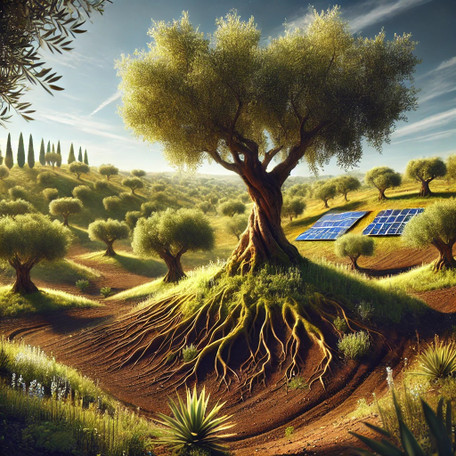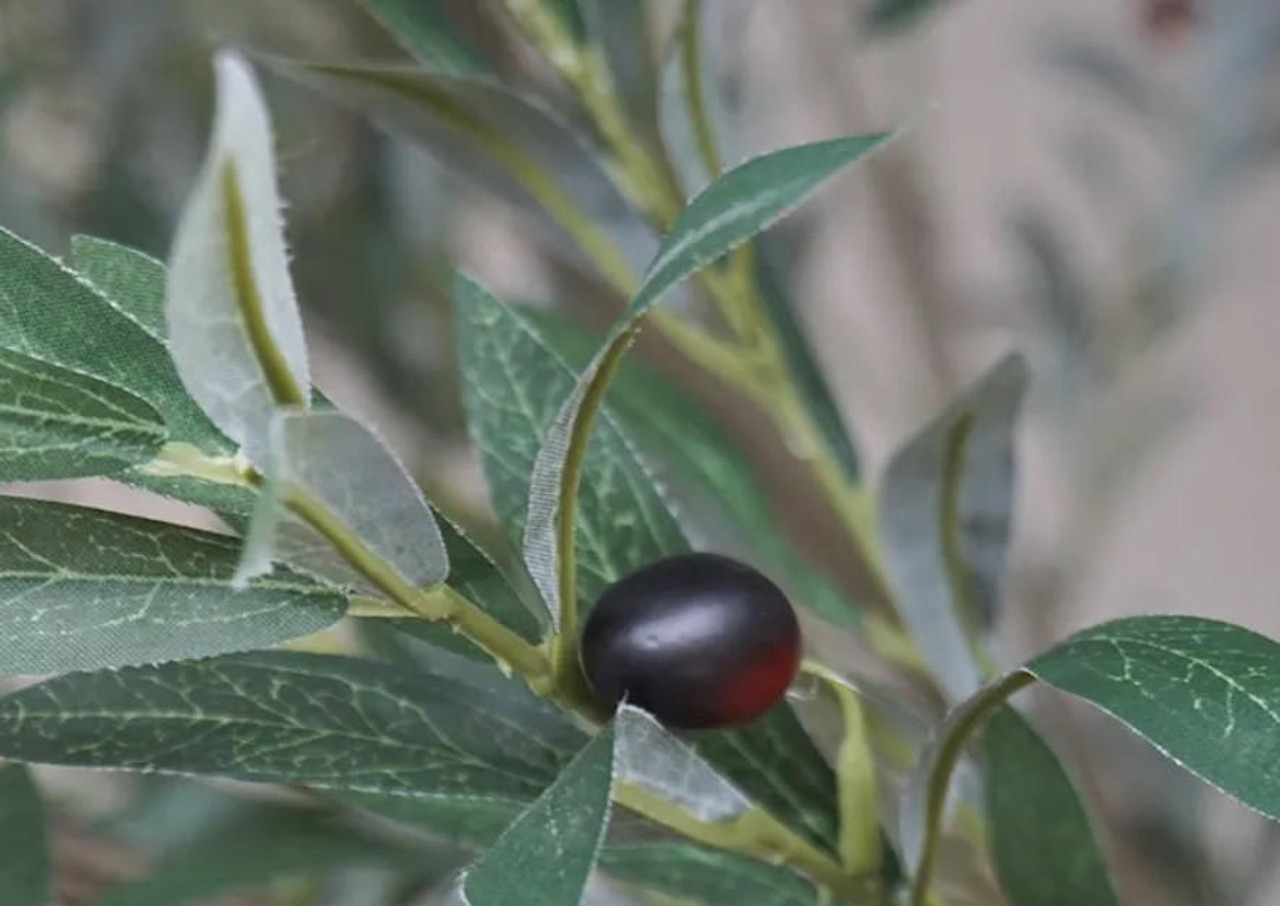Olive Trees and Sustainability: The Role They Play in Eco-Friendly Agriculture
10th Aug 2024
Olive Trees and Sustainability: The Role They Play in Eco-Friendly Agriculture
The olive tree, an ancient symbol of peace and prosperity, is also a modern emblem of sustainability in agriculture. With roots stretching back over thousands of years, olive trees have been cultivated across the Mediterranean region, thriving in some of the most challenging environmental conditions. Today, as the world faces growing concerns about climate change, soil degradation, and water scarcity, olive trees offer a beacon of hope for sustainable farming practices. Their natural resilience, minimal water requirements, and ability to prevent soil erosion make them invaluable in the quest for eco-friendly agriculture.
The Environmental Benefits of Olive Trees
1. Drought Resistance: A Key to Water Conservation
One of the most significant environmental benefits of olive trees is their remarkable drought resistance. Olive trees are native to regions characterized by long, hot summers and scarce rainfall. Over millennia, they have evolved to survive with minimal water, making them an ideal crop for arid and semi-arid regions where water is a precious resource.
Unlike many other agricultural crops that require substantial irrigation, olive trees can thrive on limited water. This characteristic not only conserves water resources but also reduces the need for energy-intensive irrigation systems. In a world where agriculture accounts for approximately 70% of global freshwater use, the ability of olive trees to grow in water-scarce environments is a significant advantage for sustainable farming.
Moreover, the deep root system of olive trees allows them to access water stored deep within the soil. This not only helps the tree survive during droughts but also stabilizes the soil, preventing erosion and reducing the need for frequent irrigation. As climate change continues to exacerbate water scarcity in many regions, the drought resistance of olive trees positions them as a crucial crop for the future of sustainable agriculture.
2. Prevention of Soil Erosion
Soil erosion is a critical environmental issue, particularly in regions with fragile ecosystems or intensive farming practices. When soil is eroded, it loses its fertility and structure, leading to reduced agricultural productivity and increased vulnerability to environmental degradation. Olive trees play a vital role in preventing soil erosion, thanks to their extensive root systems and ability to anchor the soil.
The roots of olive trees spread widely and deeply, creating a network that holds the soil in place. This not only prevents erosion caused by wind and water but also improves soil structure by enhancing its ability to retain moisture and nutrients. In regions prone to desertification, such as parts of the Mediterranean, North Africa, and the Middle East, olive trees act as a natural barrier against the encroachment of barren landscapes.
In addition to their physical impact on the soil, olive trees also contribute to the prevention of erosion through their ability to improve soil organic matter. The leaves and twigs that fall from olive trees decompose and enrich the soil with organic material, increasing its fertility and ability to support plant life. This organic matter also improves the soil’s water retention capacity, further reducing the risk of erosion.
3. Carbon Sequestration and Climate Change Mitigation
As the world grapples with the challenges of climate change, the role of agriculture in mitigating greenhouse gas emissions has come under increasing scrutiny. Olive trees, like all plants, absorb carbon dioxide (CO2) from the atmosphere during photosynthesis and store it in their biomass and the soil. This process, known as carbon sequestration, is a critical component of efforts to reduce atmospheric CO2 levels and combat climate change.
Olive trees are particularly effective at sequestering carbon due to their long lifespan and ability to store carbon in both their woody biomass and the soil. Studies have shown that olive groves can sequester significant amounts of carbon over their lifetime, making them an important tool in the fight against climate change. Furthermore, the carbon stored in the soil by olive trees contributes to long-term soil health, enhancing its ability to support diverse ecosystems and agricultural productivity.
In addition to their role in carbon sequestration, olive trees contribute to climate change mitigation by reducing the need for synthetic fertilizers and pesticides. The natural resilience of olive trees to pests and diseases means that they require fewer chemical inputs compared to other crops. This reduces the environmental impact of farming by lowering the emissions associated with the production and application of agrochemicals.
Olive Trees in Sustainable Farming Practices
1. Agroforestry: Integrating Olive Trees into Diverse Ecosystems
Agroforestry, the practice of integrating trees and shrubs into agricultural landscapes, is a key component of sustainable farming. Olive trees are ideally suited for agroforestry systems due to their ability to coexist with other crops and livestock. By incorporating olive trees into diverse farming systems, farmers can enhance biodiversity, improve soil health, and increase overall farm productivity.
In agroforestry systems, olive trees provide multiple benefits. They offer shade and shelter for crops and animals, reducing heat stress and improving microclimatic conditions. The trees’ deep roots can access nutrients and water that are out of reach for shallow-rooted crops, enhancing overall nutrient cycling on the farm. Additionally, the presence of olive trees can attract beneficial insects and pollinators, reducing the need for chemical pest control.
Agroforestry systems that include olive trees can also improve farm resilience to climate change. The diversity of crops and trees helps buffer the farm against extreme weather events, such as droughts or floods, by stabilizing the soil and maintaining ecosystem services. This resilience is particularly important in regions where climate change is expected to exacerbate environmental challenges.
2. Organic Farming: Olive Trees as a Model Crop
Organic farming, which emphasizes the use of natural inputs and ecological processes, is another area where olive trees shine. The inherent resilience of olive trees to pests and diseases makes them an ideal candidate for organic farming systems. Many olive groves are managed organically, with minimal use of synthetic fertilizers and pesticides. Instead, farmers rely on practices such as composting, crop rotation, and biological pest control to maintain soil fertility and plant health.
Organic olive farming has several environmental benefits. By avoiding synthetic inputs, organic olive groves reduce the risk of soil and water contamination, protect biodiversity, and promote the health of surrounding ecosystems. The emphasis on soil health in organic farming also aligns with the natural benefits of olive trees, such as their ability to improve soil structure and prevent erosion.
In addition to its environmental advantages, organic olive farming can be economically beneficial for farmers. Organic olive oil often commands a premium price in the market, reflecting consumer demand for sustainably produced products. This can provide farmers with a higher income while supporting sustainable agricultural practices.
3. Low-Input Agriculture: Reducing Environmental Impact
Low-input agriculture, which seeks to minimize the use of external inputs such as water, fertilizers, and pesticides, is another sustainable farming approach that benefits from the cultivation of olive trees. Olive trees are well-suited to low-input systems due to their natural hardiness and ability to thrive with minimal interventions.
In low-input agriculture, the focus is on optimizing the use of available resources and enhancing the natural resilience of the farm ecosystem. Olive trees contribute to this approach by requiring little irrigation, being less dependent on fertilizers, and naturally resisting many pests and diseases. This reduces the environmental impact of farming by lowering energy use, reducing greenhouse gas emissions, and minimizing the risk of pollution from chemical inputs.
Furthermore, low-input olive farming can be economically advantageous. By reducing the need for expensive inputs, farmers can lower their production costs and improve the profitability of their operations. This approach also aligns with the principles of regenerative agriculture, which seeks to restore and enhance the health of agricultural ecosystems through sustainable practices.
The Future of Olive Trees in Sustainable Agriculture
As the global population continues to grow, the demand for food is expected to increase, putting additional pressure on agricultural systems. At the same time, the challenges of climate change, water scarcity, and soil degradation will require innovative solutions to ensure the sustainability of food production. Olive trees, with their unique environmental benefits and suitability for sustainable farming practices, are poised to play a crucial role in the future of agriculture.
1. Expanding Olive Cultivation in New Regions
Traditionally, olive trees have been cultivated in the Mediterranean region, where they have thrived for thousands of years. However, as climate change alters weather patterns and agricultural conditions, there is potential to expand olive cultivation to new regions. Areas with similar climates to the Mediterranean, such as parts of California, Australia, and South Africa, have already seen successful olive farming ventures.
Expanding olive cultivation to new regions can provide several benefits. It can diversify agricultural production, reduce the reliance on water-intensive crops, and enhance the resilience of farming systems to climate change. However, it is important to ensure that the expansion of olive farming is done in a sustainable manner, with careful consideration of local ecosystems, water availability, and social impacts.
2. Innovation in Olive Farming Techniques
Innovation in olive farming techniques can further enhance the sustainability of this ancient crop. Advances in precision agriculture, for example, can optimize water use in olive groves by monitoring soil moisture levels and adjusting irrigation accordingly. Similarly, the development of new olive cultivars with improved drought resistance and disease tolerance can reduce the need for chemical inputs and increase the resilience of olive farming to climate change.
Another area of innovation is the use of renewable energy in olive farming. Solar panels and wind turbines can be integrated into olive groves to provide clean energy for irrigation, processing, and other farm operations. This not only reduces the carbon footprint of olive farming but also aligns with the broader goals of sustainable agriculture.
3. Promoting Sustainable Olive Oil Production
As consumer awareness of sustainability grows, there is increasing demand for sustainably produced olive oil. Certifications such as organic, fair trade, and carbon-neutral can help promote sustainable olive oil production and provide consumers with assurance that the products they purchase are environmentally and socially responsible.
Farmers and producers can also play a role in promoting sustainable olive oil by adopting best practices in cultivation, processing, and packaging. This includes minimizing waste, reducing energy use, and ensuring that workers are treated fairly and paid a living wage. By prioritizing sustainability throughout the entire supply chain, the olive oil industry can contribute to the broader goals of sustainable agriculture and environmental stewardship.
Conclusion
Olive trees are more than just a symbol of Mediterranean culture; they are a cornerstone of sustainable agriculture. Their ability to thrive in challenging conditions, prevent soil erosion, sequester carbon, and contribute to low-input and organic farming systems makes them an invaluable asset in the quest for a more sustainable future. As the world faces the twin challenges of feeding a growing population and protecting the environment, olive trees offer a promising path forward. By expanding their cultivation, innovating in farming techniques, and promoting sustainable olive oil production, we can harness the full potential of olive trees to create a more resilient and eco-friendly agricultural system.





